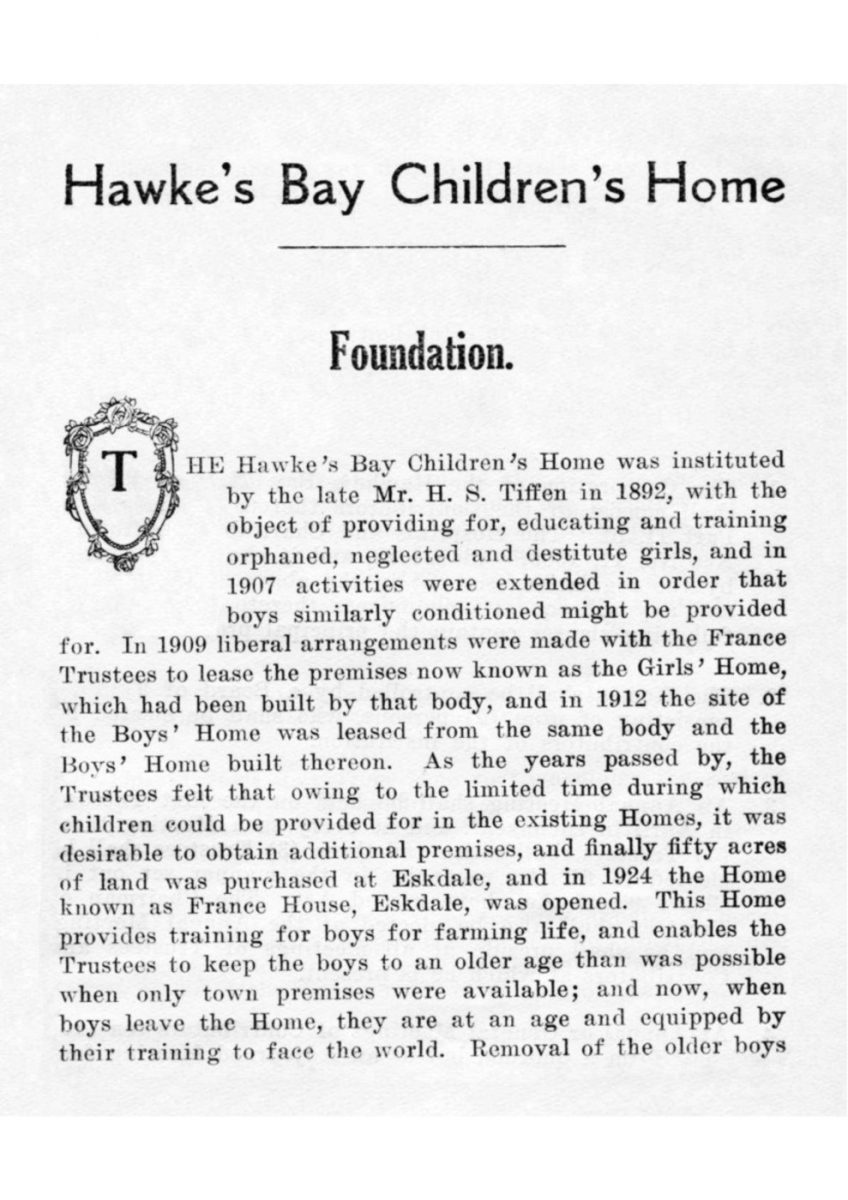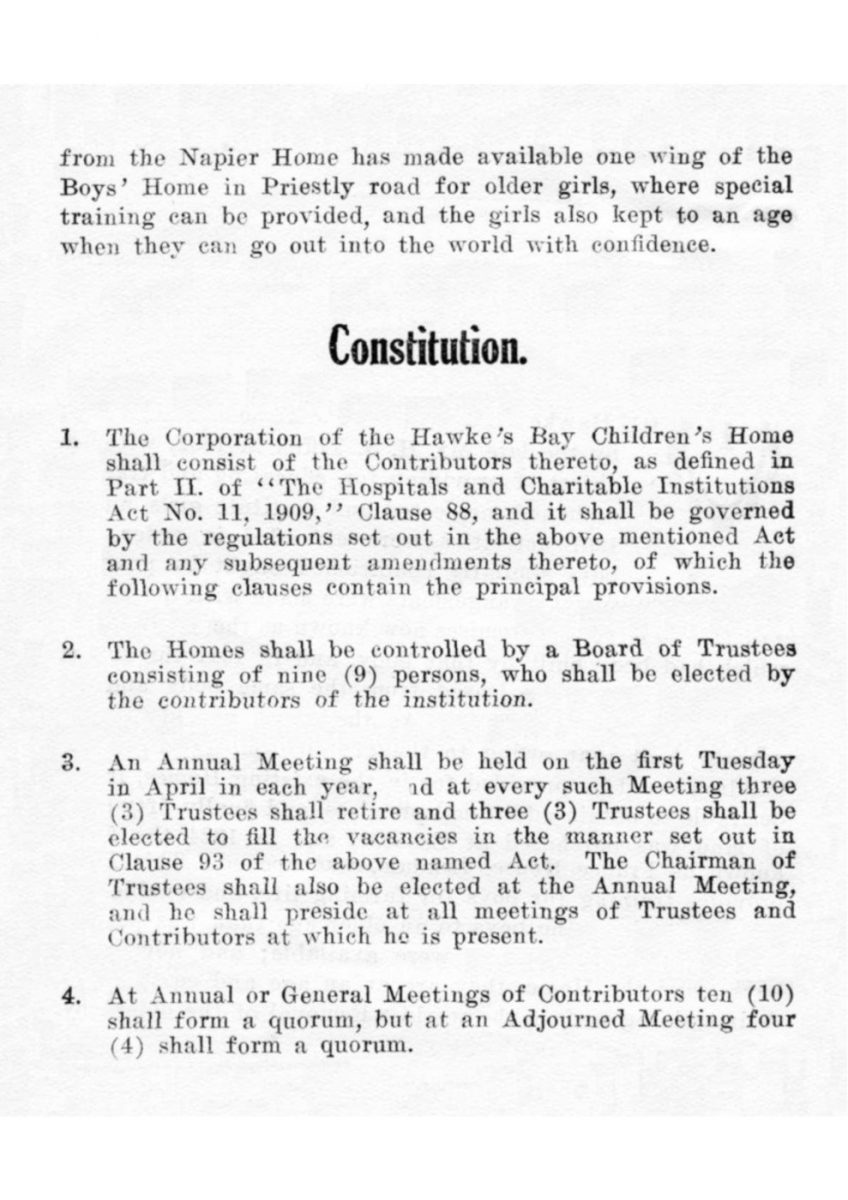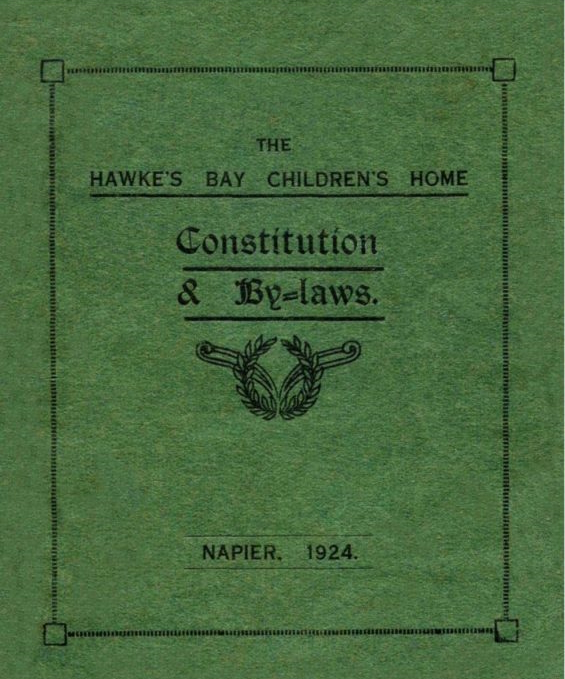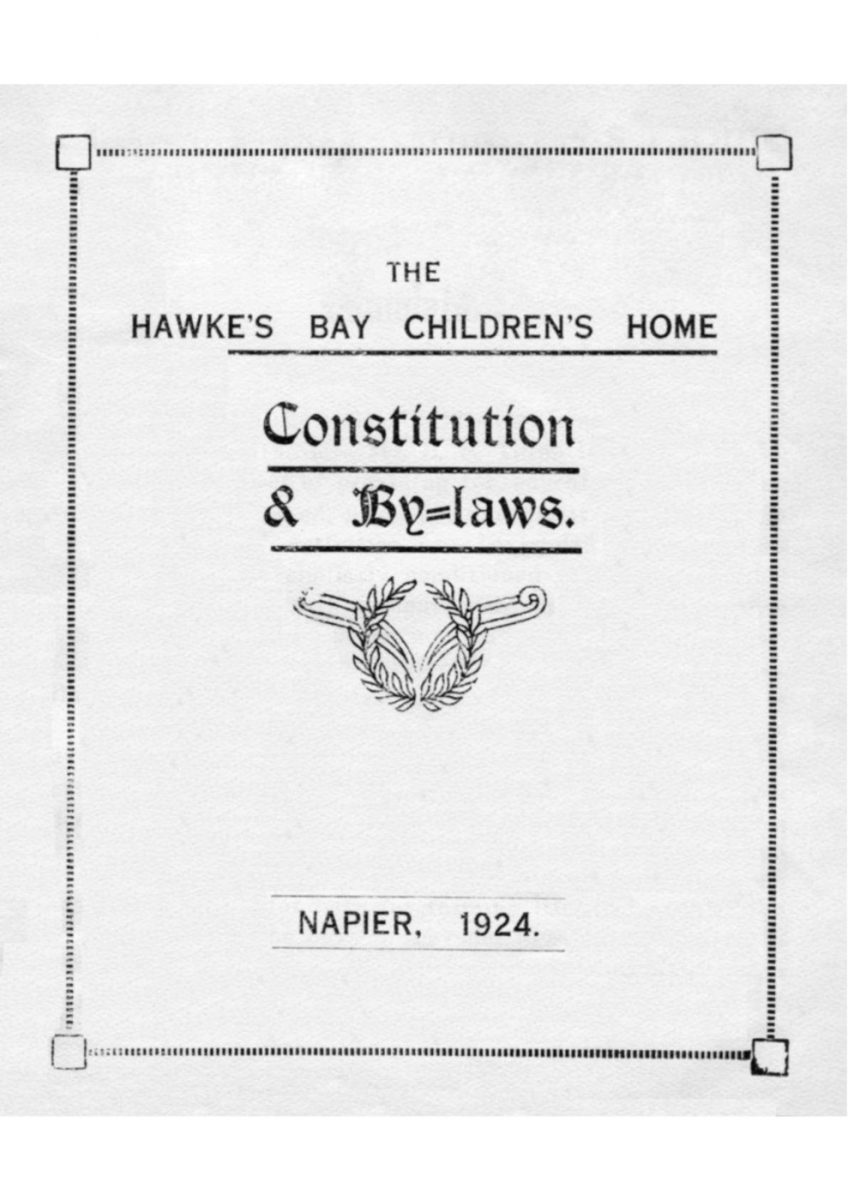- Home
- Collections
- ROBERTSON NR
- Children's Home
- Hawke's Bay Children's Home Constitution and By-laws
Hawke’s Bay Children’s Home Constitution and By-laws
Hawke’s Bay Children’s Home
Foundation.
THE Hawke’s Bay Children’s Home was instituted by the late Mr. H. S. Tiffen in 1892, with the object of providing for, educating and training orphaned, neglected and destitute girls, and in 1907 activities were extended in order that boys similarly conditioned might be provided for. In 1909 liberal arrangements were made with the France Trustees to lease the premises now known as the Girls’ Home, which had been built by that body, and in 1912 the site of the Boys’ Home was leased from the same body and the Boys’ Home built thereon. As the years passed by, the Trustees felt that owing to the limited time during which children could be provided for in the existing Homes, it was desirable to obtain additional premises, and finally fifty acres of land was purchased at Eskdale, and in 1924 the Home known as France House, Eskdale, was opened. This Home provides training for boys for farming life, and enables the Trustees to keep the boys to an older age than was possible when only town premises were available; and now, when boys leave the Home, they are at an age and equipped by their training to face the world. Removal of the older boys

from the Napier Home has made available one wing of the Boys’ Home in Priestly road for older girls, where special training can be provided, and the girls also kept to an age when they can go out into the world with confidence.
Constitution.
1. The Corporation of the Hawke’s Bay Children’s Home shall consist of the Contributors thereto, as defined in Part II. of “The Hospitals and Charitable Institutions Act No. 11, 1909,” Clause 88, and it shall be governed by the regulations set out in the above mentioned Act and any subsequent amendments thereto, of which the following clauses contain the principal provisions.
2. The Homes shall be controlled by a Board of Trustees consisting of nine (9) persons, who shall be elected by the contributors of the institution.
3. An Annual Meeting shall be held on the first Tuesday in April in each year, and at every such Meeting three (3) Trustees shall retire and three (3) Trustees shall be elected to fill the vacancies in the manner set out in Clause 93 of the above named Act, The Chairman of Trustees shall also be elected at the Annual Meeting, and he shall preside at all meetings of Trustees and Contributors at which he is present.
4. At Annual or General Meetings of Contributors ten (10) shall form a quorum, but at an Adjourned Meeting four (4) shall form a quorum.

5. Meetings of Trustees shall be held at such times and places as the Trustees may from time to time determine. The Chairman or any five (5) Trustees may at any time call a Special Meeting of Trustees.
6. The Trustees shall keep a book (to be called the “Contributors’ Book”) in which shall be entered the names and addresses of all Contributors, together with amounts contributed by each, and dates of those contributions.
7. The Trustees shall cause books to be provided and kept, and true and regular accounts shall be entered therein.
8. The financial year shall end on the 31st March in each year, and the Trustees shall cause the accounts for the preceding year to be balanced and a true statement prepared in form prescribed by regulation and submitted to the Government Audit Office for audit. After being audited, a true copy shall be sent by the Board to the Minister.
9. The Inspector-General or any Assistant Inspector may at any time visit and inspect the Homes.
10. The Trustees may from time to time under the seal of the Corporation make by-laws for the purposes and matters set out in Clausees [Clauses] 65 and 103 of the above- mentioned Act.
11. The Trustees may from time to time appoint a Secretary, a Treasurer, and such medical or other officers, matrons, assistants, or servants as they think necessary to assist in the management or control of the Homes.

By-Laws.
GENERAL.
1. Subject to the control of the Trustees, the details of arrangement for carrying on, provisioning and conduct of the Homes, including the admission of children to and discharge from the Homes, shall be managed by a House Committee of 14 members, 12 ladies (8 town members and 4 members from Petane and Eskdale districts) being elected by the Contributors at the Annual Meeting and 2 members being appointed by the Trustees from among themselves. The Chairman and Vice Chairman are ex-officio members of the House Committee. Five (5) members shall form a quorum. The House Committee shall meet at least once a month, at such time and place as may be arranged by it. In the event of a vacancy occurring on the House Committee, the Trustees shall be notified, and they may appoint successors to hold office for the remainder of the term.
2. At the conclusion of the Annual Meeting the Trustees shall meet to appoint from amongst themselves a Vice- Chairman.
3. The Secretary shall attend all meetings of the Trustees and of the House Committee and keep minutes, books and accounts as required by the Trustees. He shall produce monthly statements of expenditure to the House Committee and statements of accounts to the Trustees at their Ordinary Quarterly Meeting.
4. The House Committee shall appoint three (3) town members a Visiting Committee for the Napier Homes, one of whom shall retire each month in rotation, and two (2) of its country members as a Visiting Committee for France House, Eskdale, one of whom shall retire each month in rotation.

5. All applications for admission to and departure from the Homes shall be dealt With by the House Committee, but in cases of urgency the Chairman or Vice-Chairman may grant admission subject to the approval of the Committee at its next meeting. In dealing with applications for admission, preference shall be given to orphans, especially children who have lost both parents. Careful enquiry shall be made into the circumstances of all children on whose behalf application is made for admission.
6. Each application form shall contain an agreement, which shall be signed by the parent or any other person applying for the admission of a child to the Home, whereby the Trustees may, if they so desire it, retain the said child in the Home until the said child shall attain the age of 18 years. The parent, relative or guardian of any child admitted to the Home shall be required to sign a legal form of agreement undertaking to make regularly the payments agreed upon.
7. The ages for admission shall be between 4 and 10 years. When any girl reaches the age of 16 years an effort shall be made to find her a place with a suitable mistress where she can earn her living, unless the Committee consider it desirable that she should remain for a further period for the benefit of further training. Each girl’s case shall be reviewed by the House Committee on the completion of her primary education, and at such meeting the Matron must present a report as to the child’s character and suggestions for her future. Upon the House Committee making any recommendation for the child’s further training, the matter will be considered by the Trustees. The Matron shall be consulted before any girl leaves the Home.
At the age of 18 years boys shall be placed out to earn their own living, but where the Committee considers

it to his advantage, a boy may leave to take a suitable position at an earlier age. The Master shall be consulted before any boy leaves the Home.
8. In cases where children are admitted whose parents or relatives are unfit or unable to take charge of them, all legitimate means shall be used to constrain such parents or relatives to contribute as far as possible towards their support.
9. Before any child is admitted he or she shall be examined by an approved medical man, and if he certify as to he or she being free from any infirmity or disease which may prove a menace to the health of the other inmates of the Home, he or she may be admitted.
10. Should any child develop or show characteristics that are likely to injuriously affect other inmates of the Homes, the Master and Matron shall at once report the matter to the House Committee, who may have such child transferred to a reformatory or to the care of some other person or institution fitted to deal with the case.
11. No child shall be removed from school until he or she has passed the Sixth Standard or has reached the age of fifteen (15) years, and that no such child shall be removed from school without the consent of the Trustees being first obtained.
VISITING.
12. The visiting days at the Home shall be:-
Wednesdays 4.30 to 5 p.m.
Saturdays 2 to 4 p.m.
When relatives or friends are visiting any of the children, the Matron or her Assistant shall be present. This By-Law shall not apply to the Trustees or members of the Committee, who may visit at any time.

13. Any parent, relative or friend will be refused access to the Home unless he or she is in a fit condition to see the children, and any parent, or relative or friend who, after being refused access, trespasses on the Home grounds, shall be liable to prosecution, as provided for under the Act.
14. The Trustees shall, after consulting with the House Committee, appoint a suitable Matron and Assistants to each Home. The appointment of the Master for France House. will remain in the hands of the Trustees. The Master and Matron shall exercise a general supervision over the Homes and see that Rules made by the Trustees are carried out. He or she will be responsible for the discipline, moral tone, and general organization of the Home in his or her charge, and for the cleanliness and comfort of the inmates. He or she shall keep a Register of all children admitted into the Homes, and enter therein their names and the dates of admission and discharge.
Regulations for Staff.
1. The Master and Matron shall furnish the Secretary with a list of provisions. clothing, etc., required each month, and keep such record of deliveries of goods to the Home as may be required by the Committee for checking tradesmen’s accounts; and may, with the authority of the House Committee or Chairman, order such fresh provisions as may be required from day to day.
2. The Master and Matron shall prepare a time-table for the Homes, and shall see that the children are regular and punctual in their attendance at school, and if any child is absent, shall notify the teacher stating the cause

of absence. He or she shall read morning prayer daily, according to form authorised by the House Committee, and shall accompany the children to and from Church on Sunday mornings or arrange that their Assistants shall do so.
3. The Master and Matron shall arrange for the proper supervision of the children at all times except during school hours, and for their instruction in domestic or other duties. The instruction of girls over 14 shall include household management, cooking, laundry work, sewing, darning, cutting and setting plain work for sewing machine. A sewing class for the younger girls shall be arranged for each week. The instruction for boys shall include farming and other work.
4. The Master and Matron shall furnish a monthly report to the House Committee of the Homes under his or her care.
5. When required to do so by the House Committee, the Master and Matron shall visit the children in their situations, to keep in view their moral conduct.
6. The Master and Matron shall have full control (except engagement and dismissal) of all assistants placed under him or her, and the Assistants shall carry out all instructions of the Master and Matron and loyally support them in the execution of their duties, and shall in every way assist them to make the condition of the children as homelike and comfortable as possible.
7. When any corporal punishment is necessary the Master and Matron shall administer it.
8. The Master and Matron shall examine all correspondence received and sent by the children in the Homes.

9. The Master, Matron and Assistants shall each be allowed 28 days’ holiday in each year, not necessarily at the same time, but at such times as shall be arranged by the House Committee. The Master, Matron and Assistants shall each have one afternoon and one evening off on week days each week, not necessarily the same day each week. The Master and Matron shall arrange this time off to suit the working of the Homes under his or her care, and on Sundays each may have an alternate afternoon and evening off if the Master and Matron can so arrange, provided that sufficient control of the children is arranged for.
DIETARY SCALE.
10. The inmates shall have not less than three meals a day. The food provided for them shall be in sufficient quantity, of good quality, well prepared, properly served, and in all respects satisfactory to the Trustees or House Committee. The dining tables shall be neat and clean.
Breakfast – Porridge, bread and milk, or some similar food; bread, with butter, dripping, jam, or golden syrup, with sufficient tea or milk and sugar.
Dinner. – Hot roast meat at least once a week; boiled or steamed meat with soup at least once a week; fish once a week; for the other four days meat stew, mince meat or cold meat may be served up, but none of these more than twice. Puddings shall be supplied daily, and when possible at least one other kind of vegetable. In season vegetables to be supplied frequently. Salt, a small piece of bread, and water for drink may be provided. Puddings: Each day the inmates shall be given either suet, steamed, baked or milk puddings (with fruit when supplied to the Home gratuitously).

Tea – Bread, with butter, dripping, jam or golden syrup. Sufficient tea or milk and sugar.
Note. – (1) Not less than three-fourths of a pint of milk shall be provided for every inmate daily.
(2) The schedule need not be quite strictly adhered to, but it must truly indicate the kind of diet provided for all inmates.
(3) Except in the case of the special treatment that in the opinion of the medical officer may be found necessary for any individual inmate, any essential departure from the Dietary Scale herein shown in outline shall be allowed by permission of the Trustees or House Committee only.
Master and Matron. – In addition to the above schedule, the Master and Matron shall be allowed cocoa, coffee, grills, eggs, cheese and biscuits.
CLOTHING.
11. All clothing shall be of good quality and suited to the climate of Napier.
Boys. – The boys shall have three suits of clothes each two sets of underclothing; also two hats or caps, three pairs of socks or stockings, two pairs of boots, shoes, or sandals, and two night garments.
Girls. – The girls shall have three dresses each and three sets of underclothing (garments to be supported from the shoulders); also two hats, three pairs of socks or stockings, two pairs of boots or shoes, and two night garments.

FIRE DRILL.
12. It shall be compulsory on the part of the Master and Matrons of each home to drill the children under their respective care at least once in each month, so that in case of a fire happening either during the night or day, the children may be able to vacate the Home buildings with expedition and without confusion.
RECREATION.
13. Napier Homes. – It shall be the duty of the Matron to organise recreation for the girls and smaller boys in the grounds, and to take them for outings when occasion arises to the Beach, Botanical Gardens, or such place as the Matron shall arrange.
France House. – It shall be the duty of the Master to organise recreation for the boys in the grounds. He shall interest them in such games as Football, Cricket, Tennis, and other seasonable games. Every boy shall be taught to swim as opportunity offers.

Non-commercial use

This work is licensed under a Attribution-NonCommercial 3.0 New Zealand (CC BY-NC 3.0 NZ).
Commercial Use
Please contact us for information about using this material commercially.Can you help?
The Hawke's Bay Knowledge Bank relies on donations to make this material available. Please consider making a donation towards preserving our local history.
Visit our donations page for more information.













Do you know something about this record?
Please note we cannot verify the accuracy of any information posted by the community.